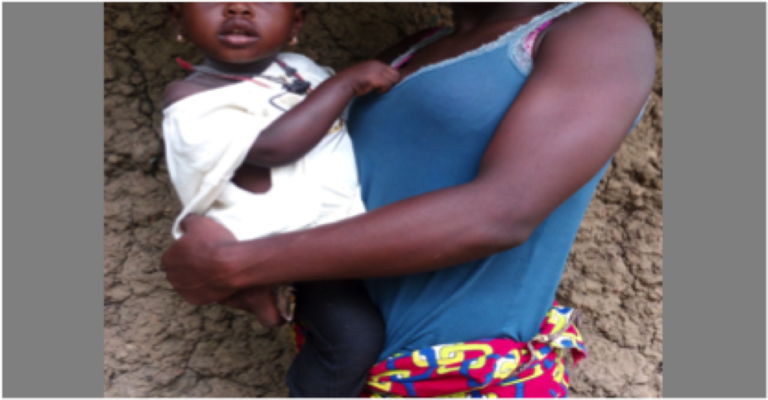By Joseph S. Margai in Freetown, Sierra Leone
October 11th each year marks the International Day of the Girl Child, and it’s on this day that Mariama Fullah, an 18-year-old class six pupil of Roman Catholic (RC) Primary School in Sahn Malen chiefdom, Pujehun District, southern Sierra Leone, has stated in an exclusive interview with Groove 106FM Correspondent that she has returned to school in order to achieve her dream of becoming a nurse.
Sitting at her mud and zinc (corrugated iron sheets) house in Sahn Malen town last Saturday, she wasted no time to grant an interview to our Correspondent even though her baby was crying for breast milk.
Mariama, who quickly breast-fed her daughter in order to lure her to sleep so that she could talk, said teenage pregnancy, which has been a major factor for the many drop-out school girls, is not a hindrance in pursuit of excellence and that she was determined not to fail even though she got pregnant at the age of 17.
Prior to her pregnancy, she was attending the Islamic Primary School in Sahn Malen but after she safely delivered in 2016, she decided to change school after she noticed that her friends teased her situation.
“My friends used to laugh at me when my pregnancy became visible while in class to an extent that I sometimes became ashamed of my very self. That was why I decided to switch over the RC Primary School,” she said.
She said at the initial stage of her pregnancy, she was going to school because it was very difficult for anyone to know that she was pregnant.
“My pregnancy was not visible until after sometime when it projected and I started to regularly fall sick. That was why I stopped going to school,” she boldly said.
Most times, boys or men who impregnate these teenagers often leave them with both the pregnancy and the baby, a similar situation Mariama went through but slightly different because she had her parents who assisted.
She also disclosed that the man, who impregnated her, was taking great care of her and the baby in fact, she said she was staying with her husband.
Her daughter, Saffiatu Bassie, is now one-year-old and has created an avenue for Mariama to enroll in her new school so as to partake in the next National Primary School Examinations (NPSE).
She said she was in class six when she became pregnant after taking the NPSE, but she didn’t pass and decided to repeat after “I have safely delivered my baby.”
“While I was taking the NPSE for the first time, I was distracted by the pregnancy. I was not concentrating on my studies and I failed, but I have come to accomplish my dream. I’m very happy to be back in school,” she said.
She said she wants to become a nurse and further said she wants to go to the faculty of science.
“My desire is to be a nurse because I want to contribute to the healthy development of people in the world. At the moment, there are many lapses in the health sector and when we take our babies to the health center on daily basis, some of the nurses are very harsh to us. This should change when some of us would have the opportunity to serve in that capacity,” she said.
At RC Primary School, she said most of her classmates know that she is a lactating mother but they don’t provoke her at all.
“One would never know that I am a lactating mother if I don’t tell that person because I am little in size,” she said.
According to the United Nations, the theme of this year’s Day is “Empower Girls: Before, during and after crises.
“Since 2012, 11 October has been marked as the International Day of the Girl. The day aims to highlight and address the needs and challenges girls’ face, while promoting girls’ empowerment and the fulfillment of their human rights. The world’s 1.1 billion girls are a source of power, energy, and creativity – and the millions of girls in emergencies are no exception. This year’s International Day of the Girl (IDG) on October 11 marks the beginning of a year-long effort to spur global attention and action to the challenges and opportunities girls face before, during, and after crises,” says United Nations in its website.
UN Women statement noted that there are 1.1 billion girls in the world, and every one of them deserves equal opportunities for a better future. They can drive change and help build a better future for all. Yet, most girls face disadvantage and discrimination on a daily basis, and those living through crises are suffering even more.
“Every10 minutes, somewhere in the world, an adolescent girl dies as a result of violence. In humanitarian emergencies, gender-based violence often increases, subjecting girls to sexual and physical violence, child marriage, exploitation and trafficking. Adolescent girls in conflict zones are 90 percent more likely to be out of school when compared to girls in conflict-free countries, compromising their future prospects for work and financial independence as adults,” the UN Women statement reads.
However, Susan Kargbo of the National Commission for Children (NCC) they using a theme from the Ministry of Education, Science and Technology (MEST) which is “Empowering Girls: Emergency Response and Resilient Planning”.
Susan Kargbo, who was in Koinadugu with her institution to commemorate this year’s International Day of the Girl Child, said Mariama’s situation as a teen mother is challenging but the road she has taken to returned to school is bright and acceptable.

